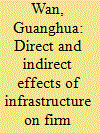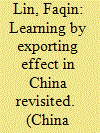| Srl | Item |
| 1 |
ID:
162629


|
|
|
|
|
| Summary/Abstract |
Using data from the 2012 China Enterprise Survey conducted by the World Bank, this study examines the determinants of intangible investment by private manufacturing firms and its impacts on firms' productivity in China, thus shedding light on the recent development of intangibles in one of the largest emerging economies in the world. Higher human capital, larger firm size and better institutional quality are found to increase the propensity and the amount of intangible investment, yet fiercer market competition generally decreases both the propensity and the amount invested in intangibles. We provide evidence that the disaggregated components of intangibles are positively correlated with firm productivity and there is complementarity between software and organization investment. Implications for policies to enhance investment in intangibles are identified from the empirical results.
|
|
|
|
|
|
|
|
|
|
|
|
|
|
|
|
| 2 |
ID:
161830


|
|
|
|
|
| Summary/Abstract |
This paper attempts to distinguish and estimate the direct and indirect effects of infrastructure on firm productivity. The latter arises from the infrastructure-agglomeration link and has been largely overlooked in the literature on infrastructure. An analytical framework is then proposed to estimate both effects. Finally, empirical results are obtained using large-scale firm-level survey data from China. Major findings include: (1) all the three kinds of infrastructure–road, telecommunication servers and cable–are found to directly promote firm productivity; (2) they also exert a positive indirect effect on firm productivity through the agglomeration channel; and (3) the empirical results are robust to different agglomeration indicators and different subsamples.
|
|
|
|
|
|
|
|
|
|
|
|
|
|
|
|
| 3 |
ID:
181620


|
|
|
|
|
| Summary/Abstract |
An appreciation in the price of housing could generate speculation opportunities for enterprises. Many firms try to seize these opportunities for quick returns. This may harm their productivity. We use the real estate boom and the investment activities of Chinese manufacturing firms during 2006–2017 to examine the processes and the net effect of housing market speculation on firm productivity. We find that housing market speculation negatively affects firm productivity by crowding out investments in research and development and productive fixed assets, and the positive effect brought about by a strengthened balance sheet and better financing capacity is outweighed by the crowding-out effect. This negative impact is more evident in state-owned firms, but is mitigated in regions and periods with better business environments. Set in the overheated housing market in China, our study contributes to the existing literature by exploring how firms’ investments outside of their main business influence firm behavior and productivity.
|
|
|
|
|
|
|
|
|
|
|
|
|
|
|
|
| 4 |
ID:
157065


|
|
|
|
|
| Summary/Abstract |
An estimate of intangible capital stock is made for a sample of about 3,200 Indian corporate firms for 2012–2013, based on investments made by the firms in various intangible assets during the previous 10 years. For manufacturing and services firms of the sample, three alternate specifications of a production function are estimated in which intangible capital is taken as an input. This analysis clearly reveals that intangible capital has a significant positive impact on productivity of manufacturing and services firms in India. The rate of return to intangible capital is found to be much higher than that to tangible capital.
|
|
|
|
|
|
|
|
|
|
|
|
|
|
|
|
| 5 |
ID:
143357


|
|
|
|
|
| Summary/Abstract |
Does exporting increase the firm’s productivity causally? Focusing on Chinese exporters over the period 1998-2007, we construct a new measure of firm-specific trade cost, based on the daily Baltic Dry Index (BDI), as an instrument of exports. The BDI is termed a leading trade cost indicator, reflecting the cost of utilizing dry bulk carriers which primarily consists of materials that function as raw material inputs to the production of finished goods. We find that a one percentage point expansion in exports raises firm total factor productivity by approximately 0.04 percentage point on average, which accounts for nearly 60 percent growth of the exporter’s productivity over the period 1999-2007
|
|
|
|
|
|
|
|
|
|
|
|
|
|
|
|
| 6 |
ID:
143411


|
|
|
|
|
| Summary/Abstract |
This paper examines the effects of market potential on Chinese firms' exports and profit by using data from the Chinese industrial enterprise database and The China City Statistical Yearbooks during 1998–2007. We find that international market potential has positive effects on firm exports, but negative effects on firm profit, while domestic market potential has opposite impacts. This finding suggests that Chinese firms' profit mainly stems from the domestic market. Moreover, the adverse impact of international market potential on firm profit diminishes with the increase of firm productivity, and some firms with higher productivity may benefit from the expansion of foreign markets.
|
|
|
|
|
|
|
|
|
|
|
|
|
|
|
|